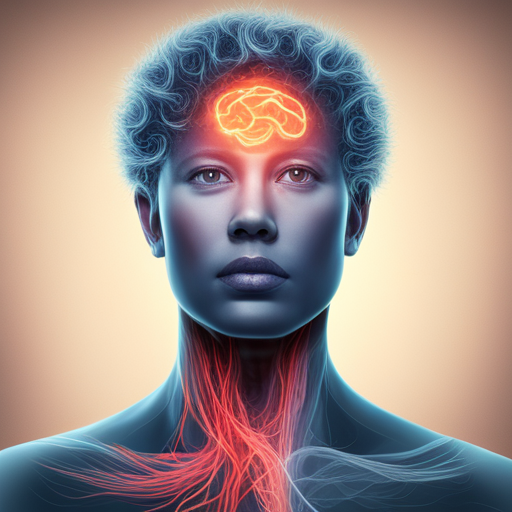
Did you know that there is a complex ecosystem of microorganisms living in your gut? These microorganisms, collectively known as the gut microbiome, play a crucial role in maintaining your overall health. But did you also know that they can influence your mental well-being, including anxiety levels? In this blog post, we will delve into the fascinating connection between the gut microbiome and anxiety, exploring the latest research and shedding light on how you can improve your gut health to potentially reduce anxiety.
The Gut-Brain Axis: Connecting the Dots
The gut-brain axis is a bidirectional communication network between the gut and the brain. It involves a complex interplay of neural, hormonal, and immunological pathways that allow the gut and the brain to communicate with each other. As it turns out, the gut microbiome plays a key role in this communication system, influencing various aspects of brain function, including mood and emotions.
The Role of Microbes in Anxiety
Research has shown that the composition and diversity of the gut microbiome can impact anxiety levels. Certain beneficial bacteria, such as Bifidobacterium and Lactobacillus, have been found to produce neurotransmitters like serotonin and gamma-aminobutyric acid (GABA), which are known to regulate mood and reduce anxiety. On the other hand, an imbalance in the gut microbiome, referred to as dysbiosis, has been associated with increased anxiety and stress-related behaviors.
Evidence from Animal Studies
Animal studies have provided compelling evidence of the gut microbiome’s influence on anxiety. For example, researchers have found that mice raised in a germ-free environment, devoid of any microorganisms, exhibit increased anxiety-like behaviors compared to mice with a normal gut microbiome. When these germ-free mice were colonized with beneficial bacteria, their anxiety levels decreased, further supporting the role of the gut microbiome in anxiety regulation.
Human Studies: Linking the Gut Microbiome to Anxiety
While animal studies are valuable in understanding the gut-brain connection, research on humans has also shed light on this relationship. In a study published in the journal Nature Microbiology, researchers analyzed the gut microbiome of individuals with and without anxiety disorders. They discovered that individuals with anxiety disorders had a less diverse gut microbiome compared to those without anxiety. Furthermore, specific microbial signatures were associated with higher anxiety levels, suggesting a potential link between gut microbiota and anxiety in humans.
Another study published in the journal Psychopharmacology examined the effects of probiotic supplementation on anxiety symptoms. The researchers found that participants who received a probiotic containing Bifidobacterium and Lactobacillus strains experienced a significant reduction in anxiety compared to those who received a placebo.
Improving Gut Health for Anxiety Reduction
Now that we understand the connection between the gut microbiome and anxiety, let’s explore some strategies to improve gut health and potentially reduce anxiety levels:
1. Eat a Healthy Diet
A balanced and nutritious diet is essential for maintaining a healthy gut microbiome. Incorporate plenty of fruits, vegetables, whole grains, and legumes into your meals to provide your gut bacteria with the fiber they need to thrive. Avoid excessive consumption of processed foods, sugary snacks, and saturated fats, as they can disrupt the microbial balance in your gut.
2. Take Probiotics
Probiotics are live bacteria and yeasts that can provide a beneficial boost to your gut microbiome. They can be found in fermented foods like yogurt, sauerkraut, and kimchi, as well as in supplement form. Look for probiotics that contain strains like Bifidobacterium and Lactobacillus, which have been shown to have anxiety-reducing effects.
3. Manage Stress
Chronic stress can negatively impact your gut microbiome and contribute to anxiety. Incorporate stress management techniques into your daily routine, such as meditation, deep breathing exercises, and regular physical activity. These practices can help reduce stress levels and promote a healthier gut environment.
Seeking Professional Help
If you are experiencing significant anxiety, it is important to seek professional help. A qualified healthcare provider or mental health professional can provide guidance and support in managing your anxiety and may recommend additional treatments or therapies.
1. Cognitive-Behavioral Therapy (CBT)
Cognitive-behavioral therapy is a type of psychotherapy that can be highly effective in treating anxiety disorders. It focuses on identifying and changing negative thought patterns and behaviors that contribute to anxiety. A trained therapist can help you develop coping strategies and techniques to manage anxiety symptoms.
2. Medication
In some cases, medication may be prescribed to help manage anxiety. Antidepressants and anti-anxiety medications can be used to alleviate symptoms and restore balance to brain chemistry. It is important to consult with a healthcare professional to determine the most appropriate medication and dosage for your specific situation.
3. Lifestyle Changes
In addition to the strategies mentioned earlier, making certain lifestyle changes can also support anxiety reduction. Engaging in regular exercise, getting enough sleep, and practicing relaxation techniques can all contribute to improved mental well-being.
Conclusion
The gut microbiome is a fascinating and influential ecosystem that can significantly impact our mental well-being, including anxiety levels. The research on the gut-brain axis and its connection to anxiety is still evolving, but the evidence so far suggests that maintaining a healthy gut microbiome may be beneficial for reducing anxiety. By following a healthy diet, incorporating probiotics, managing stress, and seeking professional help when needed, we can take steps towards improving our gut health and potentially reducing anxiety. Remember, if you are experiencing significant anxiety, it is important to consult with a healthcare professional for proper diagnosis and personalized treatment options. Take charge of your gut health and prioritize your mental well-being for a happier and healthier life.